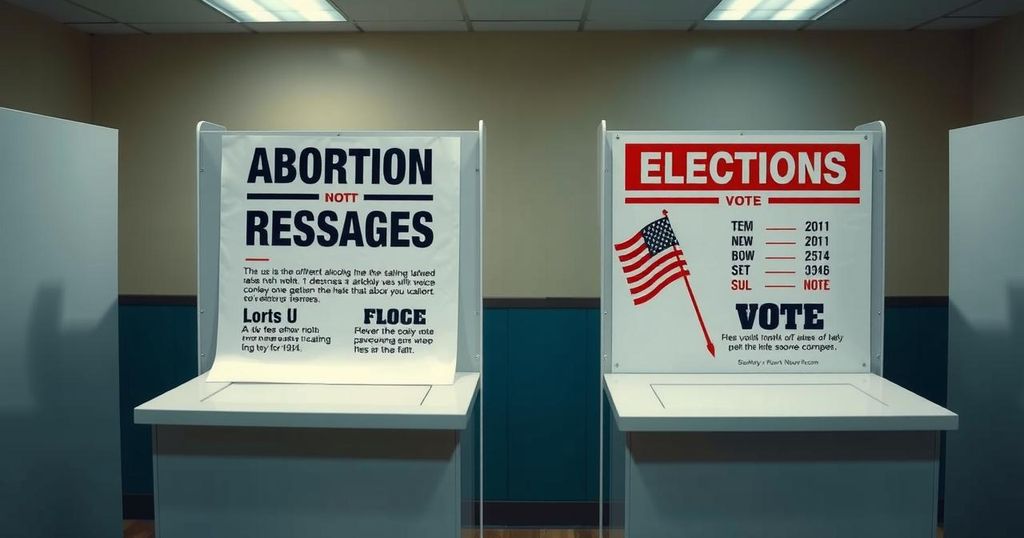Navigating the Complexities of Election Litigation and Voter Measures Ahead of 2024
As the November 5 election approaches, voters are confronted with critical ballot measures on abortion and election integrity. Former President Donald Trump is calling for a landslide victory to counter perceived electoral fraud risks. Ongoing litigation threatens to prolong disputes over the election results, reminiscent of previous cycles plagued by controversy. An extensive Republican initiative for election integrity amplifies existing strains around certification protocols, indicating a potentially turbulent election outcome landscape.
Voters in the United States are currently presented with several competing ballot measures concerning significant issues: abortion and elections. As the country approaches the upcoming election day on November 5, 2024, former President Donald Trump, the Republican presidential nominee, has been vocal about his desire for a decisive victory, stating that a landslide would render the election results “too big to rig.” Amidst ongoing recounts and opinionated discourse on voting rights, both Democratic and Republican parties seem poised for potential disputes regarding the election results, irrespective of the margins. Trump, who has yet to concede the results of the previous presidential election, emphasizes the need for a significant victory to prevent alleged electoral fraud. Numerous lawsuits regarding mail-in voting, overseas ballots, and claims of non-citizen voting are actively underway, mostly originating from Republican affiliates. Trump’s repetitive claims of widespread voter fraud, although dismissed by judicial authorities across party lines in prior elections, have been reiterated by many within the Republican Party. This time, Democrats express concerns that individuals who deny election results may hold crucial roles in areas related to voting and certification of results, raising the possibility of denial of legitimate outcomes. According to legal experts, the unprecedented surge in election-related litigation, approximately 180 cases filed this year alone, suggests a trend that has markedly escalated since the early 2000s. Campaigns now view legal battles as essential to their strategies, not merely for winning in court but also for sending a resonant political message to their supporters. Students of election law are now pondering the implications of these disputes, especially in light of new laws that could expedite judicial reviews due to certification challenges. Republicans have initiated extensive preparations, including plans to deploy 100,000 volunteers and attorneys to safeguard their version of election integrity, a strategy deeply integrated into their campaign efforts. Existing rulings that have deemed some state election laws unconstitutional add another layer of complexity, especially as judicial battles could potentially delay the vote certification process. In conclusion, the convergence of various contentious issues regarding election transparency and reproductive rights, combined with heightened partisan tensions, sets the stage for potentially prolonged legal struggles following the election. As the stakes grow higher, the electoral landscape appears fraught with tension, legal contestation, and uncertainty surrounding the acceptance of outcomes, echoing sentiments from previous elections.
In contemporary U.S. politics, voting rights and election integrity have increasingly become central issues that shape election discourse. As modifications to voting processes arose from the COVID-19 pandemic, a multitude of lawsuits have proliferated, revealing deep-seated partisan divides over the integrity of elections. The debate surrounding election legitimacy is further intensified by past allegations of fraud, many of which were decisively rejected by judicial systems. The political climate leading to the 2024 elections seems reminiscent of prior contentious electoral cycles, characterized by the intertwining of legal strategies and campaign tactics aimed at influencing public perception.
The upcoming election not only encompasses significant social issues such as abortion but is also marred by fears of litigation and disputes over election outcomes. The possibilities of lawsuits and challenges post-election time catalyze concerns about certification processes and the very integrity of the electoral system. As campaigns increasingly employ legal avenues as part of their strategies, the prospects for swift resolutions appear dim. The resulting chaos and uncertainty may reflect broader implications for democracy itself, as new rules and old tensions collide in a transformative election period.
Original Source: apnews.com




Post Comment